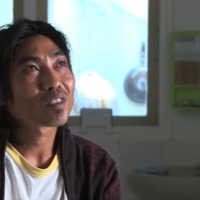
I graduated from junior high school, I had no money to continue my education, that’s when I decided to look for a job abroad. My desire was to be able to support my family.
After we drove around Dumai we stopped at a counter, and I was put in a room. Not long after, a man walked in and said he was an officer. He said “I’m a local soldier, whoever wants to go home can leave, but you will have to pay 2 million rupiah per person.”
No one wanted to pay. Afterwards, the officer walked in again and said, “Whoever wants to work, I will help you find a job.” He said, “Don’t ask too much about it, just take whatever you can get.”
After that we were taken to our working place, into the forest, Bening forest. We were sold for 500,000 rupiah per head. The recruiter looked like an honest person but his heart was not. I asked him about my daily salary. He told me to shut up or he would stab me. The boss ordered us to go into the woods, to pull all the logs out of the woods and lay them near the river.
As humans we did the work of buffaloes. After we had worked there for some time we realised, that we could end up dead there. If anybody made a mistake, the thug would be called in to kill them. He often drowned men in the river by putting them inside sacks.
We didn’t earn anything. The boss was the only one who benefitted.
We didn’t know whether the runaways were alive or dead, but their debts were still counted. As long as we were there, the boss wanted us to pay off their debts too.
When we managed to escape, I felt so happy. I was really relieved to be free of that logging job. I was ecstatic to be reunited with my family. That was the happiest moment.
The lesson I learnt is that if you travel abroad, like going to Malaysia, you have to have complete documents.
As told to documentary makers at MTV Exit.









